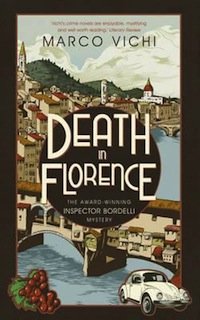Translated by Stephen Sartarelli — Italian crime writing, often preoccupied with the country’s cuisine and corruption, is among the best in the genre, yet Inspector Montalbano is really the only detective from Italy who can claim current bestseller status as a series character in the English language. Perhaps, though, author Andrea Camilleri finally has a serious rival in the shape of Inspector Franco Bordelli.
Now in his fourth outing, Bordelli is a detective whose company you relish for his combination of middle-aged introspection, dedication to fine dining (usually with a few glasses of Grappa) and a dogged resistance to authority fostered during grisly experiences as an anti-fascist partisan. He’s a bit like a southern European version of Kurt Wallander, though as Death in Florence is set in 1966 there’s an awful lot more smoking in Vichi’s novel.
Bordelli is often brooding on relationships and expresses an ardour for almost every young woman he notices, despite being in his late 50s. The absence of a wife certainly enables Vichi to maintain a familiar routine for his detective featuring a cast of acquaintances including a retired prostitute, a young Sardinian detective sidekick, a taciturn pathologist and a career criminal called Botta, who Bordelli calls upon for his culinary prowess and ability to crack any lock. ‘Let’s just say I’m implementing a policy of redistribution of wealth while I’m waiting for more honest laws,’ Botta says of his illicit lifestyle.
Death in August, the first novel in the series, was a slender volume with a cover that suggested Mediterranean cosy crime. However, it soon became evident that Vichi is an exemplary stylist who can craft an elegant mystery sustained by an atmosphere of melancholy and loss as Italy enters the modern, post-war era. The Bordelli novels became more ambitious and the third installment, Death in Sardinia, was nominated for this year’s CWA International Dagger. Death In Florence has already won several prizes in Italy, where it was published as Morte a Firenze.
With Bordelli’s noisy Volkswagen Beetle decorating the bottom corner the latest cover is, again, deceptively quaint. In fact, the story features a terrible child abduction and murder case that is almost swept away by a natural disaster, the real-life Arno River flood that left Florence under several metres of water in some parts during the course of an evening in November 1966. Of course, Bordelli drops everything to take part in the clean-up of a calamity that recalls the disasters of the War, and Vichi writes powerfully of the flooded city’s stink, mud and devastation, as well as the suspicion of corruption that’s bound to ensue during the rebuilding: ‘Catastrophes had always been good for business. Nothing new there.’
The flood intrudes on an investigation that’s proceeded slowly since the horrific discovery in the woods of the 13-year-old Giacomo, with half of a foot gnawed away by wild boar, not far from where we first encounter the detective hunting porcini mushrooms with Botta early one morning in the hills at Poggio alla Croce. The location of the buried body also dredges up memories of his partisan patrols in the same woods. When his only potential suspect, a butcher with a bluff manner, turns out to be an incorrigible fascist there’s a stirring of wartime enmities.
There’s not much obvious plotting in Vichi’s novel. Chance and coincidence are just as important in his masterful, slow-burning narrative in which the policeman’s weary desperation is only leavened by his habitual dining on Spaghetti alla Carbonara at his favourite trattoria in the company of Apulian chef Toto.
I’m just as happy to feast on Marco Vichi’s prose, which is richly evocative of a now-vanished Italy (the historical footnotes help) without drifting into sentimental nostalgia. Indeed, Death in Florence might have been the perfect period crime novel but for Bordelli’s pursuit of a shop girl more than 30 years his junior. The lonely detective deserves some happiness but this implausible romance feels like something from a lesser writer.
You can read more about Italian crime fiction here.
Hodder & Stoughton
Print/Kindle/iBook
£8.99
CFL Rating: 4 Stars









I have heard that italian crime fiction is supposed to be the new “hot” genre replacing scandinavian. I will have to look up this author.
Well, people are saying that and there are certainly more translations coming through – many of which look good. There are other voices saying that French crime fiction is the new Nordic. And others still say it’s the Germans that will take over. We’re still seeing a lot of great work from Scandinavia, and Scotland.
French crime is certainly on the rise with a joint French win for Vargas and Lemaitre for the CWA International Dagger. But it was good to see Vichi in the running and it’s impressive that one Italian anthology, Outsiders published by MacLehose, earned two nominations in the six-strong list for the CWA Short Story Dagger. I was switched on to several Italian crime writers by an excellent anthology, Crimini, published by Bitter Lemon Press five years ago.